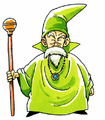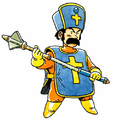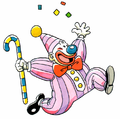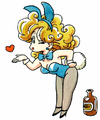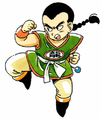List of vocations in Dragon Quest III: Difference between revisions
m (→Gallery) |
No edit summary |
||
| (11 intermediate revisions by 5 users not shown) | |||
| Line 1: | Line 1: | ||
[[File:DQ3 box art detail.png|right|thumb|The vocations available in the original version of the game, in which the thief did not appear.|400px]] | |||
The vocations system was first introduced to the series in {{DQ3}}, laying down the blueprint that all other versions of the system would derive from. At its core, a vocation in ''III'' defines the whole of a character in that their stat growth and spells learned (if any) are predetermined via their profession. The player can customize their characters via changing vocation or applying stat-boosting seeds, and in the remake of the game utilizing the [[Personality|personality]] system. | |||
==Assigning vocations== | |||
A character is created at [[Patty's Party Planning Place]], where the player will be promoted to enter their name, sex, and desired vocation. All vocations can be chosen from aside from the sage and hero. | |||
' | ==Changing vocations== | ||
The player can change a character's vocation upon reaching [[Alltrades Abbey (Dragon Quest III)|Alltrades Abbey]] and speaking with the abbot. There is no prerequisite for changing into any of the basic vocations, but doing so will drop a character back to level 1 with their stats cut in half. Any spells learned prior to this are kept however, which allows patient players to create warriors with a full repertoire of mage spells and martial artists who know all priestly spells, or simply create a character who maxes out several stats very quickly. | |||
'''[[ | ==The vocations== | ||
'''[[Hero (Dragon Quest III)|Hero]]''' (勇者, Yuusha): The Hero is the most powerful of the vocations and is restricted to the main character, being a magical knight with high attack, defence, decent agility, and powerful magic at the cost of low MP. He or she can be equipped with either heavy or light armor, and can use a variety of weapons in addition to the [[Erdrick Equipment|legendary equipment]] reserved solely for them. The Hero also is given a variety of both offensive and defensive spells. Some of the most powerful healing, defensive, and offensive spells in the game are exclusive to the Hero, including [[Kaclang]], which makes the party completely invulnerable for a short time, [[Omniheal]], which completely restores the group's HP, and the lightning spells [[Zap]] and [[Kazap]]. | |||
Only the protagonist can be a Hero, and the player will be scolded if they attempt to change vocations. | |||
'''[[ | '''[[Gadabout]]''' (遊び人, Asobinin): Gadabouts, although pretty much useless on the battle field, have a great amount of [[luck]]. This allows them to ignore the effects of debilitating spells such as snooze or dazzle much more often than other characters. The trade-off for this is the fact that Gadabouts have minds of their own, and the player cannot always control their actions. Gadabouts are the wild cards of the game, as they sometimes do damage to themselves instead of attacking enemy characters or waste a turn by goofing off. Gadabout is the only vocation that can turn into a Sage at [[Alltrades Abbey (Dragon Quest III)|Alltrades Abbey]] without any assistance, provided they are at level 20 or higher. | ||
'''[[ | '''[[Mage]]''' (魔法使い, Mahoutsukai): Mages specialize in destructive magical spells such as [[Frizz]] and [[Boom]], as well as vital support spells such as [[Kabuff]]. Mages also have access to exploration magic such as [[Evac]] and [[Peep]], which will help the player make a quick exit from dungeons and avoid dangerous [[Mimic]]s. The Mage also has the [[Hocus Pocus]] spell introduced in ''[[Dragon Quest II]]'', which has a large menu of possible random effects: some very good, some very bad. Though Mages have high [[Wisdom]], they are physically frail and cannot equip heavy weapons such as swords, axes, spears, or heavy armor. | ||
'''[[ | '''[[Martial Artist]]''' (武闘家, Butouka): Martial artists have a great amount of agility and strength. They can deal [[Critical Hit|devastating amounts of damage from a single strike]], but are limited to a very small number of weapons However, if equipped with a sword or other bladed weapon, a Martial artist's attack will actually decrease. This is because Martial artists prefer to attack with their bare hands, and so only claw type weapons will make their attack power rise. Armor for a Martial Artist is limited to lightweight tunics and clothes, and they can only equip [[Tempest shield|one shield]] in the remake and its ports. | ||
'''[[Merchant]]''' (商人, Shounin): Merchants have the ability to pick up additional gold after a battle. The amount of gold is dependent on the type of monsters which were defeated. Merchants can also appraise items free of charge. In battle, merchants are only average in attack and defense, slightly better than a Priest. They have access to a decent amount of armor and weapons, including abacuses which were added in the remakes, which are unique to them. In the remakes, merchants have two unique outside abilities: [[Dig]] (which allows the player to dig underfoot for treasure) and [[Service Call]], which summons a shopkeeper in the field. | |||
'''[[Priest]]''' (僧侶, Souryo): Priests are on the other side of the magical spectrum from Mages, as they specialize in healing and debilitating spells rather than attack magic. Introductory spells such as [[Sap]] and [[Kasap]] are useful in the early stages of the game and remain so for the whole adventure. Like Mages, Priests cannot equip heavy armor, but they can use some bladed weapons much like a Hero or a Warrior can. Priests do have initially more [[strength]], [[agility]] and [[List of character statistics#Resilience|vitality]] than Mages. | |||
'''[[Sage]]''' (賢者, Kenja): The magical abilities of a Sage are comprised of the spells belonging to both Priests and Mages as well as boasting better HP and durability than either. This class is not initially available, but a player can transform a leveled up Gadabout into one at Alltrades Abbey once the goof off reaches level 20. If the player has a rare item called the [[Words of Wisdom]], any character holding it can also become a Sage. | |||
'''[[Thief]]''' (盗賊, Touzoku): The Thief is a new class added to the remake and subsequent ports of the game. Thieves have average attack but high agility, making them more durable than one would first assume. They have the ability to [[Thievery|steal items]] at the end of a fight, which is dependent on their level. In addition, they are decent combatants that can use whips and boomerangs to attack multiple enemies at once. In the field, abilities such as [[Eye for Distance]] allow the player to locate villages and nearby towns. They can be invaluable for exploring dungeons with abilities such as [[Padfoot]] to avoid monsters and [[Nose for Treasure]], which lets the player know how many treasure chests are left. | |||
'''[[Warrior]]''' (戦士, Senshi): A warrior focuses on high attack and defense, but at the cost of high priced equipment required to be functional. Their physical abilities are higher than other classes, but they suffer from relatively low [[agility]]. They have the largest selection of weapons and armor in the game, but the downside to this is that it can become expensive to keep the warrior fully equipped in each new town. | |||
==Gallery== | ==Gallery== | ||
<center><gallery> | <center><gallery> | ||
File:DQIII Hero Famicom.png|Hero (male) | |||
File:DQIII Mage Male Famicom.png|Mage (male) | File:DQIII Mage Male Famicom.png|Mage (male) | ||
File:DQIII Mage Female Famicom.png|Mage (female) | File:DQIII Mage Female Famicom.png|Mage (female) | ||
| Line 30: | Line 42: | ||
File:DQIII Martial Artist Male Famicom.png|Martial Artist (male) | File:DQIII Martial Artist Male Famicom.png|Martial Artist (male) | ||
File:DQIII Martial Artist Female Famicom.png|Martial Artist (female) | File:DQIII Martial Artist Female Famicom.png|Martial Artist (female) | ||
File:DQIII Warrior Male Famicom.png|Warrior (male) | |||
File:DQIII Warrior Female Famicom.png|Warrior (female) | |||
File:DQIII Merchant Male Famicom.png|Merchant (male) | |||
File:DQIII Merchant Female Famicom.png|Merchant (female) | |||
File:DQIII Sage Male Famicom.png|Sage (male) | |||
File:DQIII Sage Female Famicom.png|Sage (female) | |||
File:Thief3male.png|Thief (male) | |||
File:Thief3female.png|Thief (female) | |||
</gallery></center> | </gallery></center> | ||
{{DQIII}} | {{DQIII}} | ||
{{DQIIIClasses}} | {{DQIIIClasses}} | ||
[[Category:Dragon Quest III lists]] | [[Category:Dragon Quest III lists]] | ||
[[Category:Dragon Quest III vocations]] | |||
Latest revision as of 17:58, 4 August 2020
The vocations system was first introduced to the series in Dragon Quest III: The Seeds of Salvation, laying down the blueprint that all other versions of the system would derive from. At its core, a vocation in III defines the whole of a character in that their stat growth and spells learned (if any) are predetermined via their profession. The player can customize their characters via changing vocation or applying stat-boosting seeds, and in the remake of the game utilizing the personality system.
Assigning vocations[edit]
A character is created at Patty's Party Planning Place, where the player will be promoted to enter their name, sex, and desired vocation. All vocations can be chosen from aside from the sage and hero.
Changing vocations[edit]
The player can change a character's vocation upon reaching Alltrades Abbey and speaking with the abbot. There is no prerequisite for changing into any of the basic vocations, but doing so will drop a character back to level 1 with their stats cut in half. Any spells learned prior to this are kept however, which allows patient players to create warriors with a full repertoire of mage spells and martial artists who know all priestly spells, or simply create a character who maxes out several stats very quickly.
The vocations[edit]
Hero (勇者, Yuusha): The Hero is the most powerful of the vocations and is restricted to the main character, being a magical knight with high attack, defence, decent agility, and powerful magic at the cost of low MP. He or she can be equipped with either heavy or light armor, and can use a variety of weapons in addition to the legendary equipment reserved solely for them. The Hero also is given a variety of both offensive and defensive spells. Some of the most powerful healing, defensive, and offensive spells in the game are exclusive to the Hero, including Kaclang, which makes the party completely invulnerable for a short time, Omniheal, which completely restores the group's HP, and the lightning spells Zap and Kazap.
Only the protagonist can be a Hero, and the player will be scolded if they attempt to change vocations.
Gadabout (遊び人, Asobinin): Gadabouts, although pretty much useless on the battle field, have a great amount of luck. This allows them to ignore the effects of debilitating spells such as snooze or dazzle much more often than other characters. The trade-off for this is the fact that Gadabouts have minds of their own, and the player cannot always control their actions. Gadabouts are the wild cards of the game, as they sometimes do damage to themselves instead of attacking enemy characters or waste a turn by goofing off. Gadabout is the only vocation that can turn into a Sage at Alltrades Abbey without any assistance, provided they are at level 20 or higher.
Mage (魔法使い, Mahoutsukai): Mages specialize in destructive magical spells such as Frizz and Boom, as well as vital support spells such as Kabuff. Mages also have access to exploration magic such as Evac and Peep, which will help the player make a quick exit from dungeons and avoid dangerous Mimics. The Mage also has the Hocus Pocus spell introduced in Dragon Quest II, which has a large menu of possible random effects: some very good, some very bad. Though Mages have high Wisdom, they are physically frail and cannot equip heavy weapons such as swords, axes, spears, or heavy armor.
Martial Artist (武闘家, Butouka): Martial artists have a great amount of agility and strength. They can deal devastating amounts of damage from a single strike, but are limited to a very small number of weapons However, if equipped with a sword or other bladed weapon, a Martial artist's attack will actually decrease. This is because Martial artists prefer to attack with their bare hands, and so only claw type weapons will make their attack power rise. Armor for a Martial Artist is limited to lightweight tunics and clothes, and they can only equip one shield in the remake and its ports.
Merchant (商人, Shounin): Merchants have the ability to pick up additional gold after a battle. The amount of gold is dependent on the type of monsters which were defeated. Merchants can also appraise items free of charge. In battle, merchants are only average in attack and defense, slightly better than a Priest. They have access to a decent amount of armor and weapons, including abacuses which were added in the remakes, which are unique to them. In the remakes, merchants have two unique outside abilities: Dig (which allows the player to dig underfoot for treasure) and Service Call, which summons a shopkeeper in the field.
Priest (僧侶, Souryo): Priests are on the other side of the magical spectrum from Mages, as they specialize in healing and debilitating spells rather than attack magic. Introductory spells such as Sap and Kasap are useful in the early stages of the game and remain so for the whole adventure. Like Mages, Priests cannot equip heavy armor, but they can use some bladed weapons much like a Hero or a Warrior can. Priests do have initially more strength, agility and vitality than Mages.
Sage (賢者, Kenja): The magical abilities of a Sage are comprised of the spells belonging to both Priests and Mages as well as boasting better HP and durability than either. This class is not initially available, but a player can transform a leveled up Gadabout into one at Alltrades Abbey once the goof off reaches level 20. If the player has a rare item called the Words of Wisdom, any character holding it can also become a Sage.
Thief (盗賊, Touzoku): The Thief is a new class added to the remake and subsequent ports of the game. Thieves have average attack but high agility, making them more durable than one would first assume. They have the ability to steal items at the end of a fight, which is dependent on their level. In addition, they are decent combatants that can use whips and boomerangs to attack multiple enemies at once. In the field, abilities such as Eye for Distance allow the player to locate villages and nearby towns. They can be invaluable for exploring dungeons with abilities such as Padfoot to avoid monsters and Nose for Treasure, which lets the player know how many treasure chests are left.
Warrior (戦士, Senshi): A warrior focuses on high attack and defense, but at the cost of high priced equipment required to be functional. Their physical abilities are higher than other classes, but they suffer from relatively low agility. They have the largest selection of weapons and armor in the game, but the downside to this is that it can become expensive to keep the warrior fully equipped in each new town.


